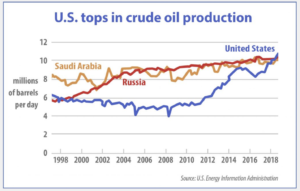by Noah Rothman, January 2020, in Commentary
The malady afflicting the country was unmistakable, according to George W. Bush. “America is addicted to oil,” the president observed in his 2006 State of the Union address. This wasn’t just an observation. It was a call to arms. If the U.S. failed to wean itself off foreign oil, the consequences for the domestic economy and U.S. foreign policy would be grave. Doing so would require substantial investments in America’s ethanol industry as well as the development of oil deposits in pristine natural parks and off the nation’s shores.
In 2008, the U.S. produced an average of just 5 million barrels of oil per day—the nadir of domestic energy production since the exploitation of fossil fuels began in the late 19th century. By 2009, the price of West Texas Intermediate crude was approaching $150 per barrel. The U.S., therefore, was obliged to spend over $1 billion per day on oil imports from foreign countries, few of which could be considered models of good governance. America’s thirst for oil propped up abusive governments in places such as the Democratic Republic of Congo, Venezuela, Pakistan, Saudi Arabia, Algeria, Mauritania, and Syria.

